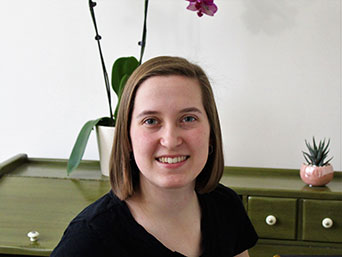
Megan Taylor, a systems engineering major, knows the importance of Mason Engineering's peer mentor center for all types of students, especially in this transition to virtual learning.
While students and faculty adjust to virtual instruction, Mason Engineering’s peer mentors are stepping up to the plate to help students with educational gaps that arise during the next few months.
The engineering school’s peer mentors are a resource for undergraduates to learn from fellow students, and with the move to virtual instruction, they haven’t lost sight of that goal.
“Some people are struggling with the change,” says peer mentor and information technology major Andreas Giannopoulos. “Students have lots of stress with the change, it is a lot all at once. We are here to not only help with the class questions but with the transition itself.”
Giannopoulos and systems engineering major Megan Taylor worked with Associate Dean Sharon Caraballo over the extended spring break to set up the Cisco WebEx platform and make the shift to virtual mentoring smoother for peer mentors and mentees.
“I had used WebEx only a couple times and didn’t fully understand it,” says Giannopoulos. “But once I learned more, I found it to be more intuitive than I initially thought. We wanted to troubleshoot issues and scenarios on how to best mentor with different topics using WebEx.”
With practice and the knowledge in hand, Taylor and Giannopoulos created a manual for students and fellow peer mentors so that they can learn how to best use the WebEx system. “The biggest way to make this effective is the peer mentors experimenting with it and letting people know that there will be hiccups,” says Giannopoulos. “Communication is important.”

Andreas Giannopoulos helped troubleshoot Mason Engineering's transition to virtual peer mentoring over the extended spring break.
Peer mentors often have to think on their feet to mentor various types of engineering courses, which require a different type of instruction and different technology to do it virtually. “And some students have different technology, so we had to make sure everyone could get the same mentoring with different resources at home,” says Giannopoulos.
“During this time, students will still run into things they need help with, and we want to be there to support those students,” says Taylor.
Caraballo echoes Taylor’s sentiment. “It’s even more important for our students to have access to support as they adjust to new modes of instruction,” she says.
With more than a week under their belts, Taylor and Giannopoulos know they will encounter different problems they need to solve, but they are ready to do their best to not only mentor students through classwork but the transition to virtual learning as a whole.
“Our peer mentors have really risen to the challenge. We’re able to provide the communications platform, WebEx, but each peer mentor needs to determine the best technology solution from what they have available to them,” says Caraballo.
Keeping this service going benefits the peer mentors themselves, too. The COVID-19 crisis has obviously had repercussions for all kinds of workers. I’m very glad we’re able to keep these students employed.”
